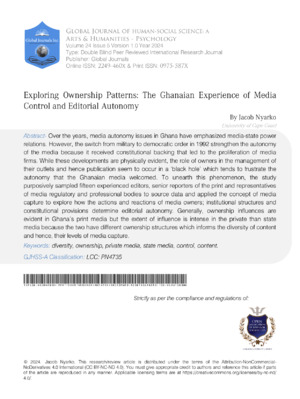Exploring Ownership Patterns: The Ghanaian Experience of Media Control and Editorial Autonomy
Keywords:
diversity, ownership, private media, state media, control, content
Abstract
Over the years media autonomy issues in Ghana have emphasized media-state power relations However the switch from military to democratic order in 1992 strengthen the autonomy of the media because it received constitutional backing that led to the proliferation of media firms While these developments are physically evident the role of owners in the management of their outlets and hence publication seem to occur in a black hole which tends to frustrate the autonomy that the Ghanaian media welcomed To unearth this phenomenon the study purposively sampled fifteen experienced editors senior reporters of the print and representatives of media regulatory and professional bodies to source data and applied the concept of media capture to explore how the actions and reactions of media owners institutional structures and constitutional provisions determine editorial autonomy Generally ownership influences are evident in Ghana s print media but the extent of influence is intense in the private than state media because the two have different ownership structures which informs the diversity of content and hence their levels of media capture
Downloads
How to Cite
References

Published
2024-11-05
Issue
Section
License
Copyright (c) 2024 Authors and Global Journals Private Limited

This work is licensed under a Creative Commons Attribution 4.0 International License.